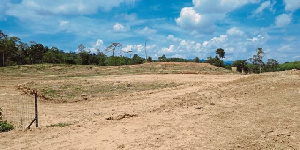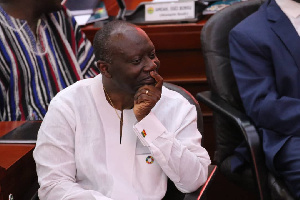9 steps to buying litigation free land in Ghana

Acquiring land/property in Ghana is much more complex and involves more processes than simply buying tomatoes at the Dome market. It, therefore, requires careful due diligence, legal considerations, and thorough verification of ownership, unlike the quick and straightforward transaction of purchasing produce at the market.
As a result of the complexity associated with land/property purchase, it is advisable to always engage a lawyer to lead the transaction. This will help mitigate risks associated with the transaction and avoid needless and costly surprises after the purchase.
A client consulted me some time ago concerning a piece of land he intended to purchase. The purchase price of the land was six hundred thousand Ghana cedis. The client did not understand why he should pay a small percentage of the purchase price of the land to me as legal fees. To him, paying a lawyer to lead the land transaction for him was not worth its weight in gold since he could personally transact with the seller.
Six months later, the client came back to my office. He had personally transacted with the seller and purchased the land. After he had paid all six hundred thousand Ghana cedis to the seller, he went onto the land and attempted to develop it, only to be stopped by some other individuals claiming ownership of the same land.
Eventually, it turned out that about four families were laying claim to the same piece of land hence, it was a subject of litigation in court. He now thought it wise to engage me to represent him in court. This time around, it cost him double the initial amount he was to pay as legal fees. This is why a lawyer should be engaged in the first place.
When the buyer consults a lawyer prior to the purchase, the lawyer will undertake the following steps in his conduct of due diligence on behalf of the buyer:
Preliminary Enquiries And Searches
It is a principle of law that there is no ownerless land in Ghana. Every inch of land in Ghana is owned by a stool, clan, family, individual, or the state upon acquisition. Subsequently, anyone desirous of acquiring land must acquire it from the entity that owns it and has the legal right to part with its ownership.
Laws that govern land administration in Ghana are complex, but one would not be excused if one buys land from a person under the erroneous impression that the said person in law could sell it because that person has an interest in the land, and it turns out that the laws do not clothe the person with the requisite capacity to sell it.
2.Verify the Identity Of the Vendor(Seller)
A prospective landowner must know his seller and further ascertain if the said seller is the proper entity to sell the land. It is a notorious fact that prospective landowners are duped by fraudsters who have been styling themselves as agents. In some cases, a person may be under the impression that he could sell land under his possession just to find out that, in law, he is not the proper person to sell it.
In verifying the identity of the seller, any state-issued form of identification should be requested to ascertain the identity of the seller. Beyond the use of different means of identification, the prospective buyer’s lawyer will go to the property,y which is the subject of the transaction, to enquire about the identity of the prospective seller from his/her neighbours.
A prospective landowner must know his seller and further ascertain if the said seller is the proper entity to sell the land. It is a notorious fact that prospective landowners are duped by fraudsters who have been styling themselves as agents. In some cases, a person may be under the impression that he could sell land under his possession just to find out that, in law, he is not the proper person to sell it.
In verifying the identity of the seller, any state-issued form of identification should be requested to ascertain the identity of the seller. Beyond the use of different means of identification, the prospective buyer’s lawyer will go to the proper, ty which is the subject of the transaction, to enquire about the identity of the prospective seller from his/her neighbours.
3. The Seller’s Duty to Prove Title
The seller is under obligation either to show that he is the owner of the interest in the land which is available for sale or to prove that someone else can be compelled to transfer that interest to the buyer. This is what is termed a good title. If it is registered land, the seller can do this by producing the land title certificate a search report from the Lands Commission with an attached site plan indicating the record of previous registration of deeds and judgments. For unregistered lands, an abstract of title should be produced. An abstract of title is a summary of all the instruments (indenture), documents, facts, and events, which together show that the seller has a title.
4. Evaluate Documents of Ownership
A major way to determine ownership of land is to evaluate the title documents. The site plan describes the land and provides measurements and locality, among other things. The site plan is enclosed in most instruments. The site plan should be consistent with the description of the land in the instrument. The instrument is the document granting title to the seller. It could be a conveyance, lease, assignment, or sublease. Where the property is inherited, wills, probates, letters of administration, and vesting assents should be provided for the necessary checks to be done.
You must also know the duration of the interest in the land. Most people assume that every land acquisition is for 99 years, but that is not so. In most assignments, the residue (number of years remaining) is not indicated, so one has to call for the head lease. The head lease is the main lease agreement between the seller, who has a leasehold interest in the land and his lessor (usually a stool or family).
Some assignments (transfer of the residue of a leasehold interest to another) have 10-20 years as the residue, and the naive prospective buyer happily acquires it, believing it’s a long-term lease.
5.Go with a Licensed Surveyor to the Land
Usually, the seller will have a site plan of the land already, but as a prudent person, a buyer must go to the land with his or her own surveyor. The buyer must make the seller point to the actual coordinates of the land for the surveyor to take the same and generate a new site plan.
The site plan is the main document used in conducting legal due diligence. Relying on the seller’s site plan could indicate a potential discrepancy in the land’s records due to errors in surveying, outdated information, or even fraudulent activity.
6. Conduct Official Searches
It is prudent to conduct searches at some government agencies which have records pertaining to land transactions and ownership. These are:
I. The Lands Commission
The Lands Commission and its regional offices have records of land and deed registrations. Depending on the location of the land, for instance, Accra is a land title registration zone, so one can conduct a search here using the current consolidated search system of the various divisions of the Lands Commission.
Previously, one would have been required to do individual searches at the various divisions, but today, whether it is public land, family land, or stool land, one wouldn’t have to search individually.
II. Town and Country Planning
Town and Country Planning Offices are in all metropolitan, municipal, and District Assemblies where the lands are zoned for specific purposes. It is, therefore, important to conduct a search to verify the zoning purposes for the land one intends to purchase. There have been situations where the land intended for purchase was marked for a road, a market, or for electrification purposes yet sold for residential use.
III. Collateral Registry of the Bank of Ghana
The Collateral Registry at the Bank of Ghana has records of mortgages and discharges of the same. A mortgage is an agreement between a property owner and a lender, mostly a bank, which lends money at interest in exchange for taking title of the property owner’s property with the condition that the lender will take the property if the money borrowed is not repaid with interest within a certain time frame.
It is important to know whether the property one intends to purchase is mortgaged and when it will be discharged.
IV. Litigation Search at the Court
There are two main reasons a vendor would want to sell his property. Either he urgently needs money to cater to some pressing issues, or there is litigation on the land, which only came to his knowledge after making the purchase.
Prospective landowners often overlook the need to conduct a litigation search at the courts with jurisdiction where the land they intend to purchase is located. The search will enable the prospective buyer to ascertain if there is any pending litigation involving the person or entity that purports to be the owner of the said land, which is the subject matter of the sale.
For instance, if the land is situated at Achimota, it will be prudent to conduct the litigation search at the Accra and Tema Courts. The value of the land will inform which of the hierarchy of the courts to conduct the search since each of the courts has its monetary jurisdiction, albeit High courts in Ghana have unfettered monetary jurisdiction when it comes to instituting fresh land cases.
It is also important to extend the litigation search to the appellate courts (Court of Appeal and Supreme Court) because most land cases in Ghana travel the full haul and hardly get their final determination at the trial courts. Cases abound where a search at the Lands Commission will reveal that a particular family, stool, or entity is the rightful owner of a parcel of land, only for the same to be overturned on appeal.
From the foregoing, you will realize that relying only on a search conducted at the Lands Commission can mislead you into thinking that the land seller is the owner of the said land without indicating that there is pending litigation on the same land.
7. Do a Sale and Purchase Agreement
This is not the indenture or title deed. This agreement affords the buyer time to do further due diligence. It is a binding agreement between the purchaser and the vendor, and neither of them can withdraw without being liable to the other for breach of contract. The agreement will state that the seller will sell the land to the buyer,r and the buyer will buy the land from the seller.
The seller cannot sell the land to any other person apart from the buyer. The agreement will indicate the timelines to do specific acts such as the payment of the full purchase price by the buyer, drafting of the indenture or title deeds by the seller, and giving the buyer vacant possession of the said land. At the time of signing this agreement, the buyer usually pays a deposit of a percentage of the purchase price. If he fails to complete the purchase, the seller may be able to keep this deposit.
8. Completion
After the buyer has fully paid the purchase price, the seller’s lawyer prepares the title deeds or conveyance instrument (conveyance, lease, sublease, assignment, etc.) and properly executes the same. It should be witnessed by at least one person. Each party takes a copy of the executed instrument, and the sale and purchase agreement expires on the date of completion.
9. Post Completion
The buyer’s lawyer will ensure that the oath of proof and certificate of proof attached to the conveyance instrument are executed and stamped at the High Court by the Registrar of Lands. Afterwards, the conveyance instrument is sent to the Lands Commission, where the stamp duty will be assessed for payment. This is a requirement for registration.
Conclusion
The complex and technical nature of land transactions in Ghana requires that a lawyer’s assistance is sought to avert any future loss of the property in litigation.
Source: Emmanuel Kesse Amoafo, Contributor





